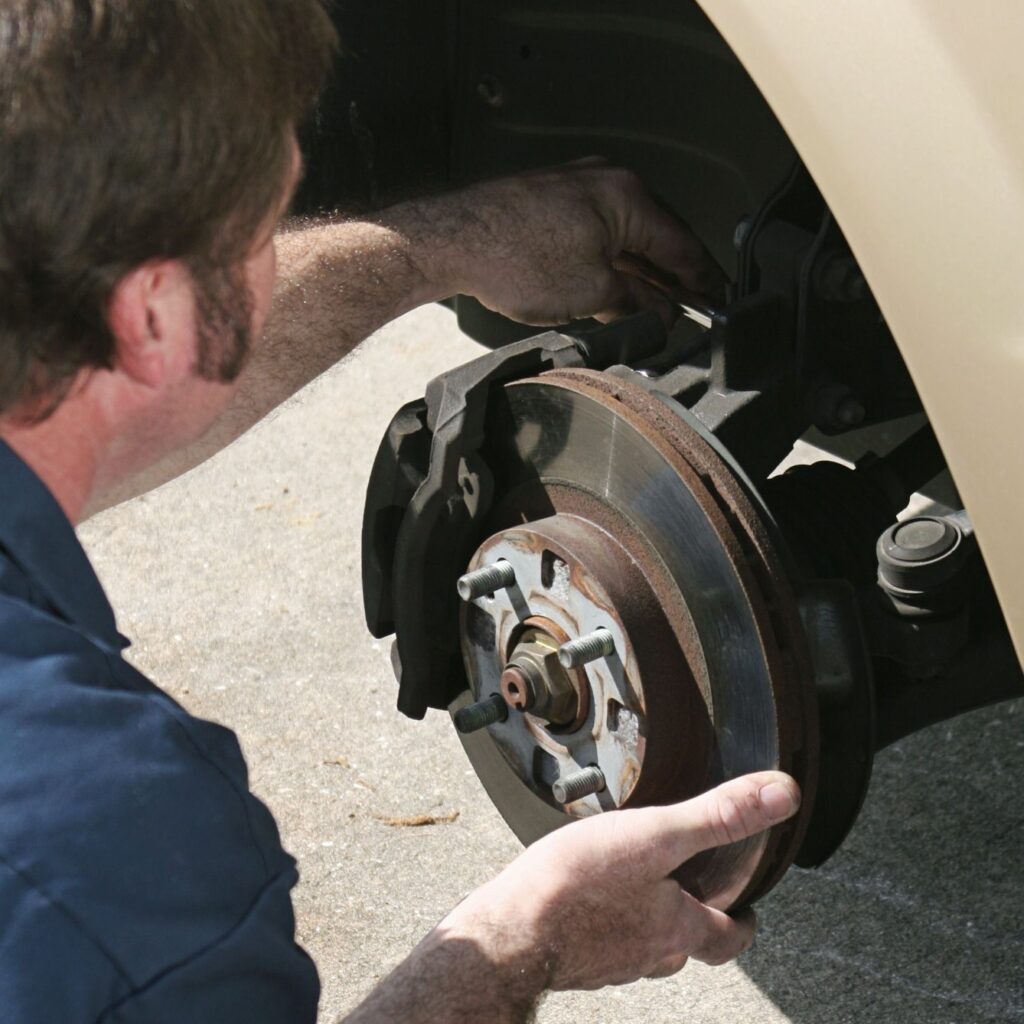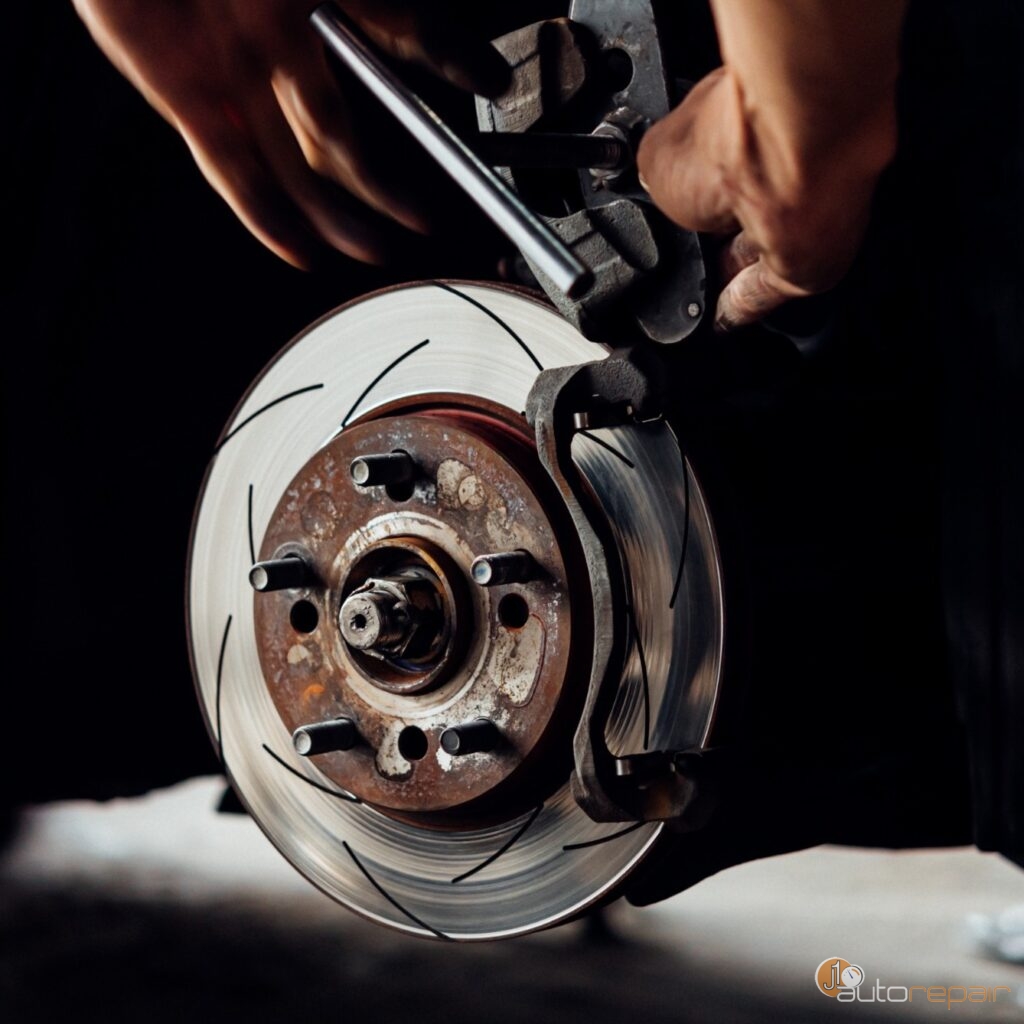
What is the grinding noise when I brake?
As you drive to work every day, or out running errands and picking up the kids, you notice an awful sound coming from your brakes. Even a person with the least amount of mechanical knowledge knows that isn’t normal, or good! Yes, it is time for a brake repair or replacement job on your vehicle.
Just like that tank of gas the dealership gave you when you purchased the car, the brakes won’t last forever. Fortunately, the brakes will last longer than the tank of gas, but you’ll need brake repair at some point. So, you’re probably asking yourself, “How do I know if I need new brakes?”, and that is what we are going to discuss in this article today.
Listen and Look
The two best ways to find out if your car needs brake repair or replacement is to listen and look, starting with the brake pads. What are the signs that your brake pads are worn? You won’t have to jack your car up or crawl underneath it, simply peak through the slots and spaces of the wheel spokes.
There is an outer pad pressed against the metal rotor. This pad should be one-fourth of an inch thick. If the pads look thinner than that, you should take your vehicle to an authorized mechanic to inspect your brakes for possible brake repair or replacement.
If your brakes have a high-pitched screech or squeal sound when you apply pressure, that is the metal shim, an indicator that manufacturers install now as a warning you need brake repair or replacement.
- Lacking Responsiveness
If your brakes are lacking responsiveness as you apply pressure, you’re almost having to ‘stand’ on the pedal to get your vehicle to stop, you need immediate brake repair. This is typically due to insufficient brake fluid or there could be air in the brake lines.
- Brakes Pulling
If your vehicle is pulling to one side as you apply the brakes, the brake lining has worn out or there could be debris in the fluid, making it ineffective. A brake repair adjusting the brakes may be all you need.
- Grinding, Growling
The brakes on your car should not make any noise. If you’re hearing a loud metallic grinding or growling sound, this indicates the brake pads are worn down and your brakes are metal to metal. Can I drive if my brakes are grinding? You can, but it isn’t advisable.
If the grinding or growling has just started, schedule an appointment with your mechanic for a brake repair as soon as possible. Two concerns you should have at this point, start with the lack of safety of bad brakes and the longer you drive it like this, the more damage your car will have.
- Vibration
- Why do my brakes vibrate when I’m stopping? If your vehicle’s brakes are vibrating as you apply pressure, this is going to require a brake repair of replacing warped rotors. The rotors get warped when you keep driving the vehicle with thin brake pads or brakes that are growing and grinding.
How do you check for brake problems?
You don’t have to be a trained mechanic or even get dirty to check for possible brake repair needs. If you notice any of the following, schedule an appointment with your mechanic soon:
- The brake light comes on and stays on.
- You’re hearing squealing, squeaking sounds.
- You’re hearing grinding, growling sounds.
- There is a vibration or wobbling in the front end as you brake.
- You notice brake fluid under the front of your vehicle.
- The brakes feel soft or spongy as you apply pressure.
- Your vehicle pulls to one side as you apply the brakes.
- You smell a burning odor as you apply the brakes.
How often should I change my brake pads?
The owner’s manual of your vehicle will have a suggested time frame, but typically, between 10,000 and 20,000 miles, you should have your brake pads checked for replacement. And the brake rotors will typically need replacing every 50,000 and 70,000 miles.
What causes brake failure?
There are 7 things are common with brake failures:
- Neglect: You haven’t had the brake fluid or brake pads checked.
- Brake pads have overheated.
- The brake rotors are worn.
- Brake lines are leaking fluid.
- The brakes have gotten wet.
- The vehicle is pulling too much weight.
Can brakes work without brake fluid?
Not as well as with the proper amount of brake fluid, and not for long! Brake fluid is essential in the proper functioning of your vehicle’s brake system. The brake fluid is what transfers the pressure from you pushing on the pedal to the brake system actually working.

Coming To A Braking End!
What happens when you have no brakes? Well, the first thing that will happen, is your vehicle won’t stop! But here are things you can do to help bring your vehicle to a safe stop:
- Continuously pump the brake pedal to build up residual pressure that will slow the car.
- Gradually and slowly press or pull on the parking brake.
- If the parking brake doesn’t work, shift your vehicle into low gears to slow it down.
- Drive the vehicle into a minimal hazardous area, away from pedestrians, vehicles, or structures.
- Don’t turn the engine off before your vehicle comes to a complete stop so you can steer it.
If you are hearing noises from your brakes, call 630-932-4427 for brake repair in Lombard and Wheaton, IL.
